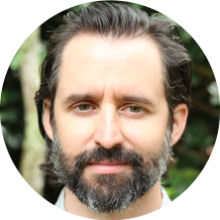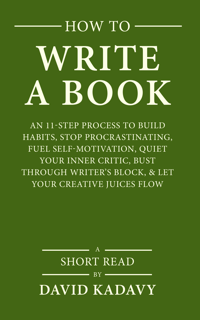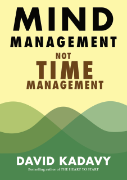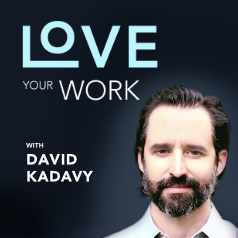Subscribe to blog updates via email »
Summary: The Triumph of Doubt by David Michaels – Love Your Work, Episode 306
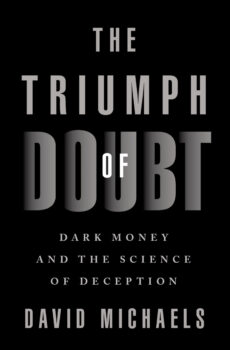 We trust the food we eat, the drinks we drink, and the air we breathe are safe. That in case they’re unsafe, someone is working to minimize our exposure, or at least tell us the risks. In The Triumph of Doubt, former head of OSHA David Michaels reveals how companies fight for their rights to sell harmful products, expose workers to health hazards, and pollute the environment. They do it by manufacturing so-called “science.” Most this science is built not upon proving they’re not causing harm, but by doing whatever they can to cast doubt. Here, in my own words, is a summary of The Triumph of Doubt: Dark Money and the Science of Deception.
We trust the food we eat, the drinks we drink, and the air we breathe are safe. That in case they’re unsafe, someone is working to minimize our exposure, or at least tell us the risks. In The Triumph of Doubt, former head of OSHA David Michaels reveals how companies fight for their rights to sell harmful products, expose workers to health hazards, and pollute the environment. They do it by manufacturing so-called “science.” Most this science is built not upon proving they’re not causing harm, but by doing whatever they can to cast doubt. Here, in my own words, is a summary of The Triumph of Doubt: Dark Money and the Science of Deception. Listen to the Podcast
- Listen in iTunes >>
- Download as an MP3 by right-clicking here and choosing “save as.”
- RSS feed for Love Your Work
Products we use every day cause harm
Chances are you’ve cooked on a pan coated with Teflon. Teflon is one of many polyfluoroalkyl substances, or PFAS. When introduced in the 1940s, they were considered safe. We now know they’re linked with high cholesterol, poor immune function, cancer, obesity, birth defects, and low fertility. PFAS, it turns out, have such a long half-life, they’re called “forever chemicals.” PFAS can now be found in the blood of virtually all residents of the United States, and have been found in unsafe levels worldwide – in rainwater. You’ve probably heard that, in moderation, alcohol is actually good for you. But even one drink a day leads to higher overall mortality risk. More than one drink, greater risk of cardiovascular disease and cancer. Alcohol is a causal factor in 5% of deaths worldwide – about 3 million a year. 13.5% of deaths between ages 20–39 are alcohol-related. If you’re in pain after an injury or surgery, your doctor might prescribe for you an opioid. But the rise in opioid addiction is responsible for the first drop in U.S. life expectancy in more than two decades. It’s sent shockwaves throughout society. It’s helped launch the epidemics of fentanyl and heroin overdoses, and the number of children in foster care in West Virginia, for example, rose 42% in four years. You might love to watch professional football. But NFL players are nineteen times more likely to develop neurological disorders, and thirty percent could develop Alzheimer’s or dementia from taking so many hits.The “product defense” industry sows doubt
How have they done it? How have companies been able to manufacture and sell products that cause so much harm, for so long? They do it by defending their products, when the safety of those products are questioned. On the surface, that’s not so bad. But besides lying and deliberately deceiving, they abuse society’s trust in so-called “science,” and our lack of understanding of how much we risk when we move forward while still in doubt.The tobacco industry is a pioneer of product defense
There’s an entire industry that helps companies defend their products from regulation: It’s called, appropriately, product defense. The tobacco industry is most-known for its product defense. In 1953, John W. Hill of the PR firm Hill & Knowlton convinced the tobacco industry to start – one floor below his office in the Empire State Building – the Tobacco Industry Research Committee (TIRC). The TIRC was supposed to do rigorous scientific research to understand the health effects of smoking, but mostly they just attacked existing science, doing what they could to sow doubt. Just a few years earlier, in 1950, a study had found heavy smokers were fifty times as likely as nonsmokers to get lung cancer. With the help of the TIRC, it would take a long time for these health risks to influence public policy. About thirty years later, most states had restricted smoking in some public places such as auditoriums and government buildings. Smoking had proliferated in American culture when cigarettes had been provided in soldiers’ rations in WWI. Michaels describes one surgeon who, in 1919, made sure not to miss an autopsy of a man who had died of lung cancer, because it was the chance of a lifetime. He didn’t see another case of lung cancer for seventeen years, then saw eight within six months. All eight had started smoking while serving in the war. Today, more than a century after cigarettes were widely introduced, we’ve finally seen a massive reduction in smoking in the U.S. We can fly on planes and go to restaurants and even bars, without being exposed to secondhand smoke.The sugar industry has been at it even longer
Predating the product defense efforts of the tobacco industry is actually the sugar industry. The Sugar Research Foundation was started in 1943. Scientific evidence first linked sugar with heart disease in the 1950s. In 1967, as Dr. Robert Lustig told us, Harvard scientists published in the New England Journal of Medicine an article blaming fat rather than sugar for heart disease. Fifty years later UCSF researchers discovered the scientists had been funded by the Sugar Research Foundation – which they hadn’t disclosed. Even more misleadingly, they had disclosed funding that actually made them look more impartial – from the dairy industry.Companies and industries set up “astroturfing” organizations
The Sugar Research Foundation and the Tobacco Industry Research Committee are are early examples of “astroturfing” organizations. This tactic of the product defense industry involves setting up organizations with innocent- or even charitable-sounding names, then doing low-quality research to defend a company or industry’s interests.- The American Council for Science and Health has published articles opposing regulation of mercury emissions, and attacked science finding harm in consumption of sugar and alcohol.
- When the National Football League was first looking into the effects of playing their sport, they formed the MTBI. the “M” in MTBI gave away their stance: TBI stands for Traumatic Brain Injuries, and this committee formed for finding the effects of brain injuries was called the Mild Traumatic Brain Injuries committee.
- The alcohol industry set up the Alcoholic Beverage Medical Research Foundation. The first board of directors included Peter Stroh, William K. Coors, and August A. Busch III. Their first president, Thomas B. Turner, was former dean of Johns Hopkins University Medical School, a tie of which they made good use in promoting their agenda – more on that in a bit.
- The American Pain Foundation ran campaigns to make pain medication more widely available for veterans, running ads reminding patients of their “right” to pain treatment.
Astroturfing organizations are funded by “Dark Money”
Astroturfing organizations are funded by so-called “Dark Money”. In other words, they do whatever they can to hide where their funding comes from, lest their biases become obvious.- The American Council for Science and Health claims much of their funding comes from private foundations, but investigative reports have found 58% of it coming straight from industry, and that many of those private foundations have ties to corporations. Leaked documents show a huge list of corporate donors including McDonald’s, 3M, and Coca-Cola.
- The NFL’s MTBI committee’s papers included a statement saying, “none of the Committee members has a financial or business relationship posing a conflict of interest.” Yet the committee consisted entirely of people on the NFL’s payroll: team physicians, athletic trainers, and equipment managers.
- Documents collected by the New York Times revealed that administrators at the The National Institute on Alcohol Abuse and Alcoholism wanted to do a randomized clinical trial on the effects of alcohol. To fund the study, they went to industry, calling it “a unique opportunity to show that moderate alcohol consumption is safe.” They were going into the study with the conclusions already in mind, saying, “one of the important findings will be showing that moderate drinking is safe.” Several companies pledged nearly $68 million toward the $100 million budget. As part of the National Institutes of Health – a federal organization – the NIAAA was pitching this as a chance for the alcohol industry to use a government-funded study to prove their product was safe. Money directly from alcohol manufacturers was to be routed through the NIH Foundation, since it’s illegal for private companies to fund government studies.
- When the Senate Finance Committee began investigating ties between the American Pain Foundation and pharmaceutical companies, the APF quickly dissolved, apparently knowing what would be found otherwise.
Using connections and flawed science to manufacture pseudo-events
When corporations do get studies published about the risks of using their products, they’re often low-quality studies. If they don’t deliberately conceal their findings, they often use their connections to create what are essentially pseudo-events to prop up their flawed conclusions.- Internal documents from DuPont show they knew the PFAS in Teflon was a problem. In 1970, they found it in their factory worker’s blood. In 1981, 3M told them it caused birth defects in rats, and DuPont’s own workers’ children had birth defects at a high rate. In 1991, DuPont set an internal safety limit of 1 ppb. Meanwhile, they found a local water district had three times that amount. In 2002, they set up a so-called “independent” panel in West Virginia, and set a safe limit at 150 times their own internal safety limit – so they’d have less-strict standards for polluting their community’s drinking water. In 2016, the Environmental Protection Agency set a safe limit of 70 ppt (trillion!) – less than one-one-hundredth DuPont’s previous internal safety limit.
- The NFL did very little for many years to ask serious questions about the long-term effects on their players. When players Junior Seau and Dave Duerson committed suicide, they both shot themselves in the chest instead of the head, so their brain tissue could be studied after their deaths. The MTBI argued that players were clearly fine if they returned to play shortly after concussions. They abused the concept of survivorship bias, arguing that those who didn’t drop out of football in college or high school and made it to the pros were more resistant to brain injury. The editor of the journal, Neurosurgery, which published MTBI’s papers, was a medical consultant to the New York Giants, and later to the commissioner’s office – a clear conflict of interest.
- I mentioned earlier the first president of the alcohol industry’s ABMRF was a former dean of Johns Hopkins. When ABMRF published a study, the Johns Hopkins press office would issue a press-release, which would instantly make the study seem more credible. One of the studies that has proliferated throughout media and culture, finding that moderate alcohol use is actually good for you, was a door-to-door survey – a very flawed methodology. Non-drinkers in a study are likely to include people who don’t drink because they’re already sick, or are former abusers of alcohol.
- One of the main “papers” the pharma industry used to defend their positions that opioids had a low risk of addiction was, from 1980, a five-sentence letter to the editor of the New England Journal of Medicine. It’s a letter, not a paper – there was no peer review. It has been cited hundreds of times in medical literature – often by researchers with ties to opioid manufacturers. TIME magazine unfortunately called it a “landmark study.” (This is a great example of a pseudo-event: the proliferation of flawed information throughout media made it accepted as true.)
The double-standard in access to study data
The papers that do get published by the product-defense industry are usually not original studies. They’re often reanalysis of existing data. Industry takes advantage of the Shelby Amendment, which the tobacco industry promoted under the guise of concern over pollution. The Shelby Amendment requires federally-funded researchers to share any data they collect. In this way, industry can reanalyze the data in ways that arrive at any conclusion they want. So, “re-analysis” has its own cottage industry within product defense. When industry does conduct original studies, they don’t have to share their data, and so it isn’t subject to the same scrutiny.Manufacturing doubt in other industries
The Triumph of Doubt goes on and on with examples of deception and collusion from various industries. Some other highlights:- Volkswagen installed a device in their diesel cars to detect when their emissions were being tested. The device would activate, causing the car to pollute forty times less, only when being tested.
- Johnson & Johnson knew as early as 1971 their baby powder was contaminated with asbestiform particles – asbestos-like particles that cause cancer – but pressured scientists to not report them.
- Monsanto publishes many studies in Critical Reviews in Toxicology, which Michaels calls “a known haven for science produced by corporate consultants.” Many authors have done work for Monsanto, don’t disclose their conflicts of interest, and have denied Monsanto had reviewed their papers – later litigation showed they had.
Should chemicals be innocent until proven guilty?
There’s a concept called the precautionary principle. It states that when we know little about what the consequences of an action will be, we should err on the side of caution. If a new chemical is developed, we should wait before we let it get into our food and water. If a new technology is invented, we should wait until we introduce it to society. In criminal courts, a defendant is innocent until proven guilty beyond a reasonable doubt. We like this, because we hate the idea of someone being thrown in jail despite being innocent. And we can physically remove someone dangerous from society and more or less stop them from continuing to harm others.Criminal harm can be halted, chemical harm cannot
But this is also our policy for chemicals, drugs, and potentially dangerous activities. We have an extremely high bar for deciding something is harmful enough we should reduce our exposure to it. OSHA – the Occupational Safety and Health Administration – has exposure limits for only 500 of the many thousands of chemicals used in commerce. Because the regulatory process is so onerous, Michaels says, in the half-century OSHA has been around, they’ve updated only twenty-seven of those 500. Yet, as with PFAS, even after we start reducing our exposure, the effects of harmful substances keep going. As one Stockholm University scientist has said about PFAS in rainwater, “We just have to wait…decades to centuries.” And, unlike a criminal court, where the only people motivated to keep from punishing a defendant are the defendant’s lawyers and family members, huge networks of people stand to profit from harmful products – executives, shareholders, and entire industries have the incentives to conspire and collude.Balancing harm with innovation
On the other hand, the precautionary principle can slow or halt innovation. Many products that may be harmful may also be useful. Teflon and other PFAS have a huge number of applications. Supposedly it’s been replaced by other chemicals in cookware – though they’re probably similar (taking advantage of loopholes in the slow regulatory process). Supposedly exposure potential from cooking is low – but you know now how hard it is to “trust the science.” As horrifying as some of these abuses of science are, you can’t be horrified by them without at least some sympathy for those who didn’t want to get the COVID vaccine: If a product is immediately harmful to everyone who takes it, that’s easy to prove. But could it harm some people in the long term? It’s nearly impossible to be sure. There’s more money and power behind sowing reasonable doubt than behind exposing sources of harm. Meanwhile, it’s easy to sow and abuse the existence of doubt, and that’s why it’s the main tactic used in product defense.There’s your summary of The Triumph of Doubt
If you liked this summary, you’ll probably like The Triumph of Doubt. As a career regulator, Michaels comes off as somewhat biased, clearly partisan at times, a little shrill with his use of dramatic terms such as “Big Tobacco” and “Big Sugar.” Get ready for lots of alphabet soup, as you try to keep track of the myriad agencies and foundations identified by acronyms. Because of media’s key role in the doubt-sowing Michaels writes about, I’ll be adding this as an honorable mention on my best media books list.Join the Patreon for (new) bonus content!
I've been adding lots of new content to Patreon. Join the Patreon »
Subscribe to Love Your Work
Listen to the Podcast
- Listen in iTunes >>
- Download as an MP3 by right-clicking here and choosing “save as.”
- RSS feed for Love Your Work
Theme music: Dorena “At Sea”, from the album About Everything And More. By Arrangement with Deep Elm Records. Listen on Spotify »
